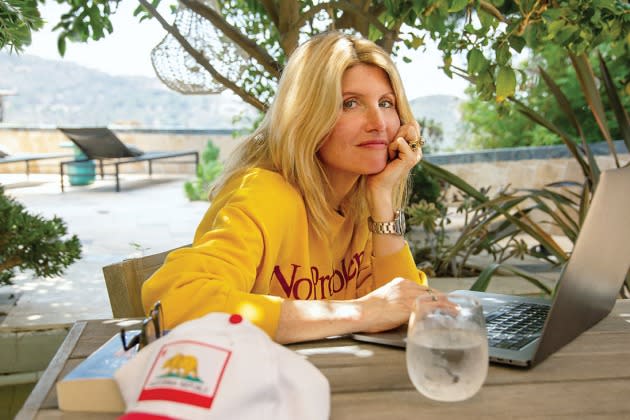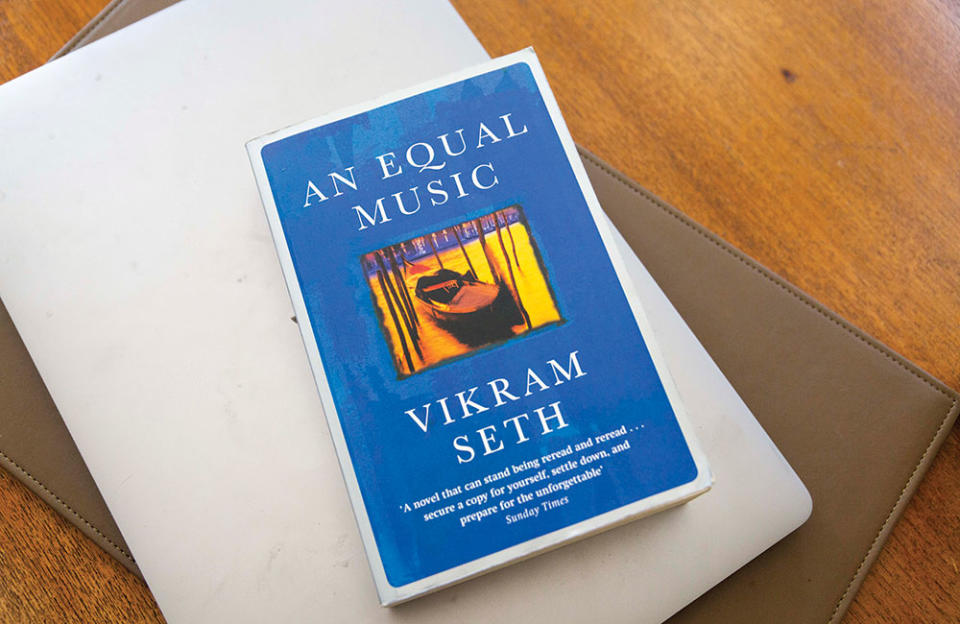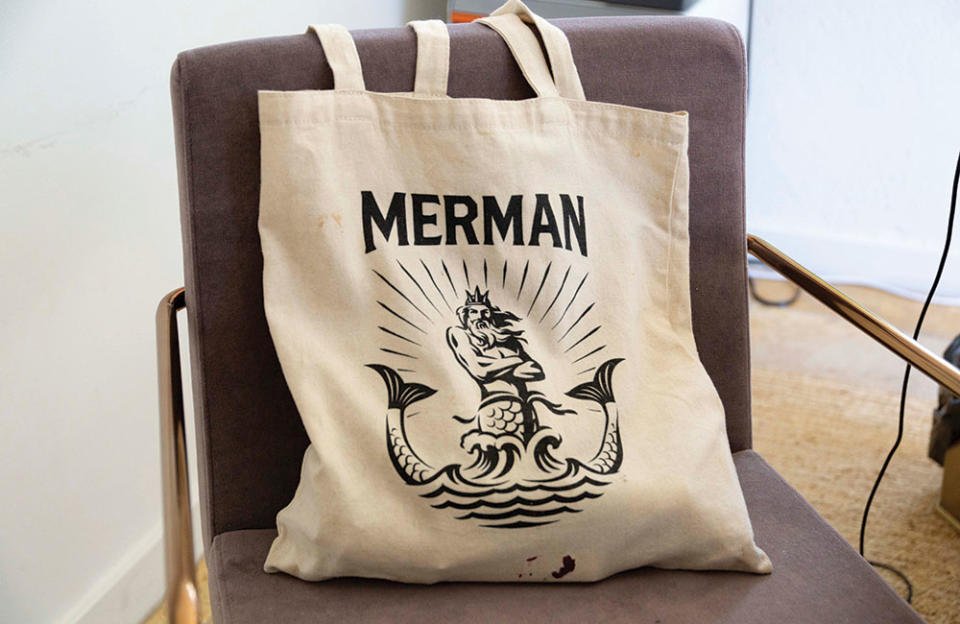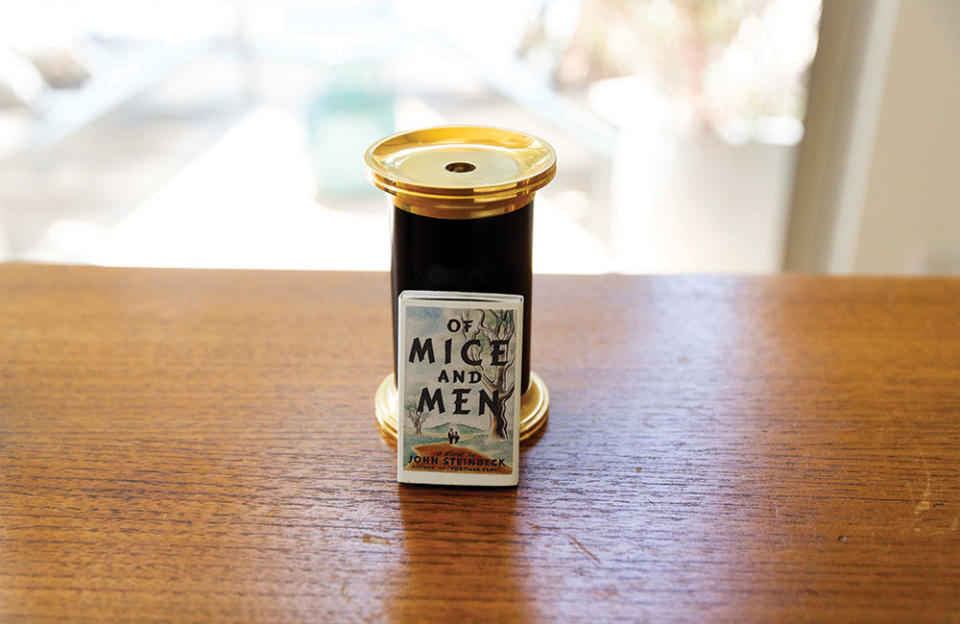Sharon Horgan Can’t Help Writing Herself Into Uncomfortable Situations
- Oops!Something went wrong.Please try again later.
- Oops!Something went wrong.Please try again later.

When Sharon Horgan writes at her Los Angeles home, she pivots between the office and a shady patio. In her primary London home, she has a writing attic. But that’s not usually where you’ll find her. “If I’m really honest, sometimes I write in bed,” she says. “Makes me feel like a bit of a pig — just shit all over the place!”
Regardless of the locale, it’s working. The writer and actress is one of the most prolific creators working in TV today. Having created Pulling, Catastrophe and Divorce — as well as starring in such films as Game Night and The Unbearable Weight of Massive Talent — the Irish multihyphenate has launched two series in 2022 alone. She co-created Starz’s Shining Vale and, come Aug. 19, debuts Bad Sisters on Apple TV+. This latest passion project, which she writes, stars in and produces under her Merman banner, is an adaptation of a Flemish drama about five sisters who agree to murder one’s misogynist husband. It’s new ground for Horgan on several fronts. But, as she says during a Zoom from her parents’ Dublin home in August, she’s not interested in repeating herself.
More from The Hollywood Reporter
Warner Bros. Discovery to Divest in Right-Leaning U.K. TV Startup GB News One Year After Launch
Netflix Teams With 'Blown Away' Producer Marblemedia for 'Drink Masters' Reality Series (Exclusive)
You have a reputation for being an idea generator. Is Bad Sisters your first work in adaptation?
I got sent so many things to adapt over the years — books or Israeli series that they thought could get a U.K. or U.S. makeover. It never appealed to me. It sounded so difficult. Then I adapted a short for Modern Love. I loved that I could use my imagination around a story that already existed.
So what made this the one?
I love the sisters in the original, that dynamic of a five-headed monster. I liked the idea of doing an hour and a thriller. I thought, “Just do it. Do something that you’re scared of.”
What scared you?
How do I make it my own? It felt quite big and different from what I normally do. I’m a “six half-hour episodes” kind of girl!

When you wrapped Catastrophe, what did you think would be next?
I’m in my 50s now. I’m divorced. My children are becoming grown-ups. Everything’s changing in my life. I thought I wanted to write about that. That’s really fertile ground. But I found that I was too close to it. To turn anything tragic into comedy, it needs time and space. And I was already worrying about repeating myself. I didn’t want to get too navel-gazey and indulgent — like using TV as therapy.
You have a lot of creator credits. How do you decide between the shows where you write every episode and those where you’re less involved in the day-to-day?
It normally works itself out. With something like Shining Vale, that was an idea I had that I thought I was going to write myself. That goes back ages, but Divorce got picked up and I shelved it. My manager at the time didn’t want to let go of the idea, so he was like, “Let’s just find the right showrunner and you can be as involved as you want.” It works for some projects. Then something comes along like Bad Sisters, and it takes over your life for a couple of years. This, I felt like I needed to own.
Shining Vale seems like it could have generated more attention. Do you chalk that up to it being on Starz or the glut of TV right now?
I completely agree. I was so upset that Courteney [Cox] didn’t get an Emmy nomination. I know that doesn’t mean everything, but she’s so fucking good! It’s a beautifully put-together show and hard to make. Starz put everything behind it. They’ve got a show with Greg Kinnear, Mira Sorvino and Courteney Cox. It’s a big deal. It’s breaking through in a way, but it should be more.

You have a producing partner, Clelia Mountford. What does she do that you can’t?
She’s a mover and shaker. She convinced Jon Hamm and Daniel Radcliffe to do A Young Doctor’s Notebook, so she gets things done. She’s very good at the stuff that I don’t want to do: courting commissioners and having cheese and wine in the right places.
Because you said “commissioner,” I now have to ask you about the differences between doing business in the U.K. and the U.S. Seems like it’s getting more similar.
It all feels very similar now, except budgets. In the U.K., you have tiny budgets — sometimes 10 times less. But even so, you always run out of money. It doesn’t matter whether you were making a $4 million episode or a $400,000 episode.

Are notes still that different?
I was just talking to [Shining Vale co-creator and showrunner] Jeff Astrof about this. He’s thinks that if you don’t know how to write a joke, “Fuck off. Don’t tell me, ‘Make this funnier.’ ” But I would say Americans are much better at being like, “Good job,” first. Jeff and I met up to talk about season two, and he was like, “Don’t give me a pile of notes and not a pat on the back first!”
I think the most important thing is that the project stays the same. If you take something to whoever and say, “I want to make this,” it’s because you love it. You have a point of view. But it can be squashed into a different shape if you get into that ” yes” culture to get it commissioned. You agree to things that you never thought you’d agree to, anything to get it going. Then you’re attached to something you don’t want. “Take it back!” Work is 50 percent of your life, so it’s important that you don’t screw that up.

You’ve said that filming Divorce adversely affected your mental health. Have you put up professional guardrails to make sure that doesn’t happen again?
I just don’t let myself get too emotionally involved. I made a pact with myself to not lose it. I work really hard but remember that it’s just a TV show. Divorce was different. It was my first big American TV series. I was away from home and trying to write Catastrophe at the same time. It was just too much. I missed my kids. But at the same time, I wanted to be all over it. That was just impossible. Even though I didn’t love it, I definitely learned a lot.
Catastrophe and Divorce present a nice juxtaposition. When you write more intimate scenes, do you approach them differently when you’ll be the one acting them out?
It doesn’t even come into my mind in the slightest. It’s the weirdest thing, like someone puts me on as a meat suit and writes it. Sometimes, I’m really like, “Why did I write that?” I regret it afterwards. On a micro, silly level, why would I put myself in a bikini? Now I’ve got to go on a diet for two months. Why would I have two pages of crying? That’s really hard to do! If I thought about it, I would curb the story too much. So I just don’t think about it at all until I’m doing it. Then, I curse myself.
Interview edited for length and clarity.
This story first appeared in the Aug. 10 issue of The Hollywood Reporter magazine. Click here to subscribe.
Best of The Hollywood Reporter

